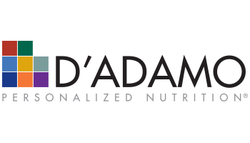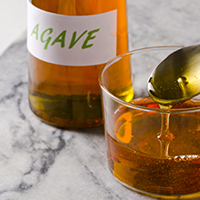Volume 12, Number 04
SPECIAL FOCUS: SUGAR AND METABOLISM
- Molecules and Metabolism - A new research article by Dr. Peter J. D'Adamo
- Finding the Sweetness in Life by Martha D'Adamo
- Helpful Tips: 5 Healthy Sugar Alternatives
- 3 Healthy Blood Sugar Balancing Smoothies that are Right For Your Type
- April Product Specials: 15% OFF select products
Molecules and MetabolismBy Dr. Peter J. D'Adamo |
|
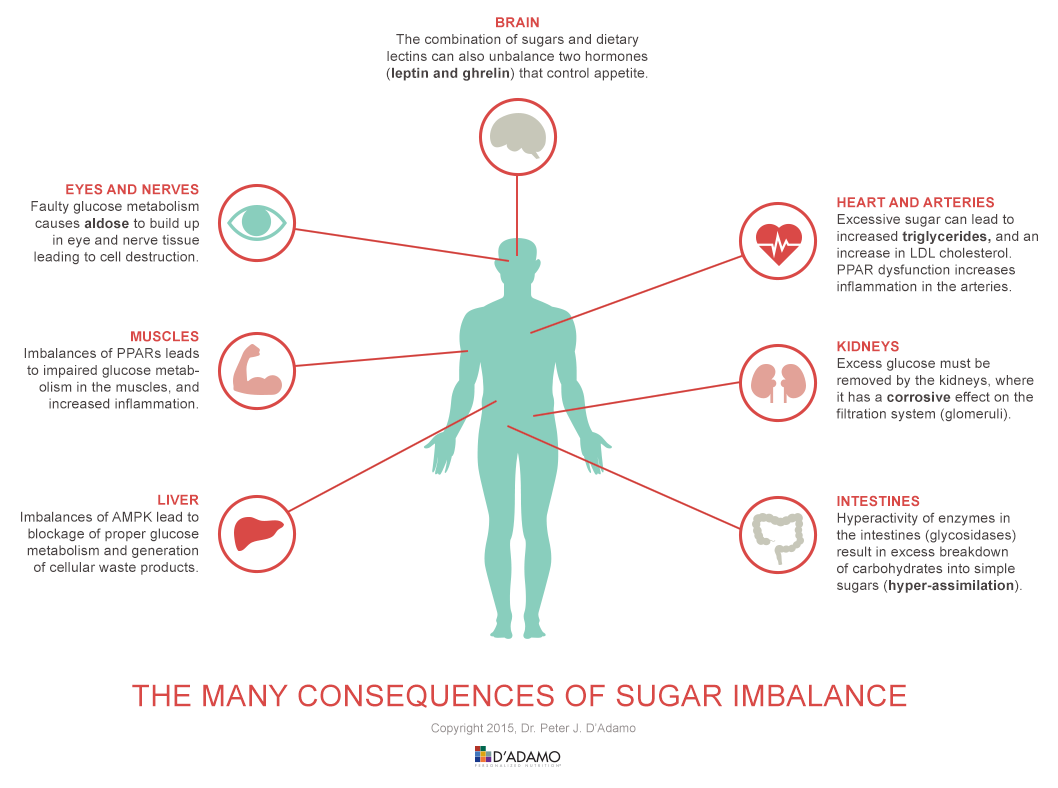 |
|
 |
Sometime at the beginning of the millennium, biology moved from the 'age of chemicals' to the 'age of molecules.' These molecules often work in web-like networks, mostly because life likes redundancy. The more ways things interact and support each other, the more likely everything works better. Strangely, our understanding of obesity and metabolism still lies squarely in the age of chemicals, exemplified by the old saw, 'if you want to lose weight, just eat less.' This is not only ineffectual, but is also harmful --laying the blame solely on the lifestyle choices of the person, and often implying a lack of control and even gluttony on the part of the sufferer. Certainly some fault can be laid at the doorstep of Big Agribusiness. Most prepared foods are just empty calories, cleverly (and I might add scientifically) designed to work on our worst addictive impulses. Everything seems to get a dose of extra sugar these days, sometimes even table salt. The industrial switch from more natural sugars to high fructose corn syrup was a big factor as well. But as we will see, the epidemic of obesity and diabetes in the Western World is not just the result of excess calories, but also a perfect storm of genetics and environment, nature and nurture. In this article I'd like to introduce you to a few concepts that may help you understand just how widespread the health effects of sugar dysregulation are, and what you can do about it. Although there are a lot of factors and intermediaries involved, the metabolism of sugar is really a very simple fork in the road. Glucose is the biologically useful form of sugar: It can be converted to energy, or stored as fat for future use. Most problems result when the body uses Yogi Berra's advice about what to do when you come to a fork in the road ('take it') gets confused, and does the wrong thing. If stored as fat, the fat must be converted back into glucose before it can be burnt. Lacking fat and a source of glucose in the diet, the body will even resort to converting protein into glucose, although this is inefficient and more-or-less only done in emergencies. Most of our sweeteners --such as sucrose (table sugar) are combinations of glucose and other sugars (in the case of sucrose, glucose and fructose.) The body can even make glucose from other sugars. The molecular part of the sugar story centers around the amazing differences in the outcome of this very basic relationship, especially when we look at it organ by organ. Although the pancreas is the majordomo of sugar metabolism, secreting the hormones that regulate glucose metabolism, ironically it is not typically an organ that suffers tissue damage from sugar imbalances. Here are a few that do and some intelligent supplementation you can use to protect them from these ill effects: |
 |
BRAIN Dr. D'Adamo's Suggested Protocol: |
 |
EYES AND NERVES Dr. D'Adamo's Suggested Protocol:
|
 |
HEART AND ARTERIES Dr. D'Adamo's Suggested Protocol:
|
 |
MUSCLES Dr. D'Adamo's Suggested Protocol: |
 |
LIVER Dr. D'Adamo's Suggested Protocol:
|
 |
KIDNEYS Dr. D'Adamo's Suggested Protocol:
|
 |
INTESTINES Dr. D'Adamo's Suggested Protocol:
|
Finding the Sweetness in LifeBy Martha D'Adamo |
|
 |
As I began working on this issue of the newsletter, I found myself thinking about the role that sugar has played in my life. I was a 1950's era child, raised on processed foods, and sugar played a starring role in my life. Sugar was a reward; something to strive for; the great comforter and the ultimate nurturer. At the time, there wasn't the awareness of the detrimental role that sugar plays in our physical and emotional well-being. Luckily, I became aware of the destructive side effects of sugar as well as the level of addiction to it that I have. The triggers for me are emotional: I am tired, so I want sugar; I am sad, so I want sugar; I am happy, so I want sugar. It's like I am hard wired to sugar cravings based on my emotions. Eating right for my type has addressed the overall cravings, but they still pop up from time to time. Don't get me wrong – I do indulge, whether it is a piece of flourless chocolate cake, or a piece of chocolate, chocolate chip cookies (made with spelt), but I try not to have sugar when I feel that I "need" it or I "have" to have it, as it leaves me victim to the sugar cravings rather than dealing with the emotional basis of the desire. I've developed a couple of ways to deal with this, and I want to share them with you.
It's good to remember that sugar isn't just in cookies, cakes, desserts, and candy; it lurks in dark places, like salad dressings, marinades, sauces, many condiments, cereals, dried fruits and yogurt. So when you can, make your own or if you are out, ask for sauce on the side. We have a lot of great tools, particularly the Eat Right for Your Type cookbooks, which can help with food preparation and sugar management. And thanks to Peter's keen formulating skills, we have a trio of products that help to minimize sugar cravings as well as maintain healthy blood sugar levels in the body: Glycoscia, El Dorado and Deflect (O | A | B | AB). Here's hoping that we find the sweetness in life in our experiences and relationships, and not our food. Martha |
Helpful Tips: 5 Healthy Sugar Alternatives |
||
|
Refined sugar is considered as addictive as a drug and potentially as detrimental to your health. Yet, according to the U.S. Department of Agriculture, the average American consumes anywhere between 150 to 170 pounds of refined sugars in one year! It is clear that collectively we have a serious habit to kick. Sure, there are plenty of sugar-free sweetener alternatives on the market but those chemically created artificial sweeteners are even more toxic than refined sugar. Ending your sugar addiction doesn't mean that you have to stop enjoying a hint of sweetness – it just requires that you find healthier alternatives. Below are five all-natural, blood-type friendly options. |
||
|
|
Agave Syrup (Neutral for all blood types and secretor types) |
|
 |
Raw Organic Local Honey (Neutral for blood types A secretor & non-secretor, B secretor & non-secretor, O secretor and AB secretor, avoid for O non-secretor and AB non-secretor) |
|
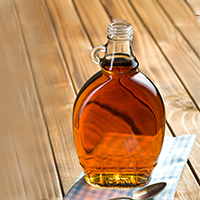 |
Pure Maple Syrup (Neutral for blood types A secretor & non-secretor, B secretor & non-secretor, O secretor, and AB secretor; avoid for O non-secretor, and AB non-secretor) |
|
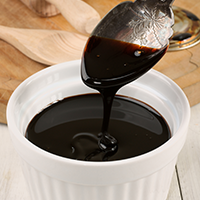 |
Molasses (Beneficial for A secretor and neutral for all other blood types and secretor types) |
|
 |
Stevia (Neutral for A secretor & non-secretor, B non-secretor, AB secretor & non-secretor, and O secretor; avoid for B secretors and O non-secretors) |
|
Blood Sugar Balancing Green Smoothies that are Right For Your Type |
|||
 |
|||
Type OSpring Green Smoothie |
Type ATropiKale Smoothie |
Type B/ABSavory Strawberry Smoothie |
|
|
Ingredients:
Directions:
|
Ingredients:
Directions:
|
Ingredients:
Directions:
|
|
|
Find more delicious, simple to prepare recipes in the Eat Right for Your Type Personalized Cookbooks |
|||
